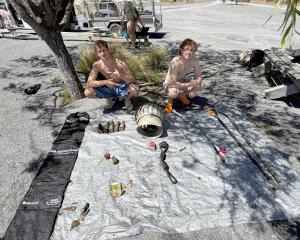Central Otago District Council liquor licensing inspector Ray Applegarth told about 100 publicans, liquor licence holders and others fees imposed by the Act could be considered harsh and he was recommending the council take a lighter approach.
For some, the costs of renewing their liquor licence could go up by 400% under a new classification system that was based on factors such as the establishment's size, nature, operating hours and any previous breaches of the liquor law.
Those on the lowest end of the scale would be charged an application fee for renewal of $368 plus an annual fee of $172.50. Those on the other end of the scale, though, would be charged $1023 and $1250 respectively, he said.
The figures compared with the previous regime of $793 for a three-year renewal, with no annual fee.
There were many disappointed, shocked faces around the room as people counted the costs they might face.
Mr Apple-garth said it was unlikely the council would need that much money to cover its licensing costs and he would therefore recommend a reconsideration of the criteria be enshrined in the council's local alcohol policy.
That would reduce council income by $100,000 but the income received should be adequate to cover costs, he said.
Some publicans said the council's LAP, still in the draft stage, might not go far enough.
There was a provision in the Act for licensees to provide patrons with free drinking water but Cromwell's Brew House owner Graeme McDowell said with the council charging for water through water metering, that was unfair.
''In business, if you buy something, you sell it.''
Other publicans appeared confused as to where the new rules left them but said it seemed Mr Applegarth was doing his best to ease the burden they were facing.
Other speakers at the breakfast included local police and Hospitality New Zealand deputy chief executive Sara Tucker, of Wellington.
She said some things in the new Act, promotions for example, were unclear.
''Some areas are very much open to interpretation and opinion and are yet to be tested by courts.''
Signs outside a bar advertising anything to do with free alcohol, a buy-one-and-get-one-free deal or a free-beer-until-the-first-try-is-scored deal, for example, would not be allowed.
However, the same signs could be displayed inside a bar. Senior Constable Gordy Pay said there seemed to be a lot of misinformation about the new liquor laws but ''day-to-day operations are generally the same'' and ''as long as people are talking about it, it's a good thing''.
One of the new things was that police could write licensees, and patrons, instant fines for things such as breaching a liquor ban, allowing minors to be in a restricted area, for providing a fake ID, and for a licensee failing to display the duty manager's full name.
''So the days of using a nickname are gone. We don't need to know your middle name. Unless it's a really embarrassing name, then you should display it.''
He said police were still receiving the odd complaint about some establishments not offering food throughout the whole time alcohol was being sold, which could now incur an instant fine, as would failing to ensure advice was given on safe transport options.
''You're [duty managers and licensees] only as good as your stupidest staff member,'' he said.
Senior Sergeant Alan Grindell, of Wanaka, said police were hoping to develop closer working relationships with licensees as a way to help reduce alcohol-related harm.
Ms Tucker urged everyone present to make a submission on the council's draft LAP.
Submissions close at 5pm on Thursday.












